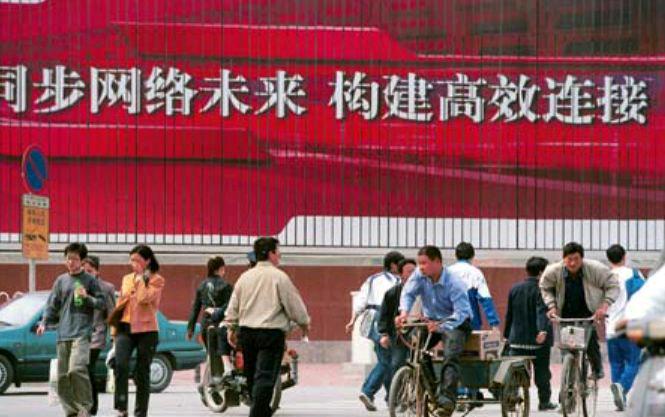2000-2010:Birthplace of the Chinese Internet
2014-09-11byZiMo
by+Zi+Mo
To a large extent, the Chinese internet began in Zhongguancun. In 1994, the National Computing and Networking Facility of China, a computer network linking research institutes and major universities in the Zhongguancun area, officially accessed the early internet, making China the 77th country to achieve full connectivity.
In 1996, a huge billboard at the start of Zhongguancun South Street amazed passersby with characters reading, “How far is the information superhighway from Chinese people? 1,500 meters north.” The billboard inspired Chinese dreams of the internet, and Zhongguancun, dubbed “Chinas Silicon Valley”, became the mecca for reaching for such dreams.
That year, after graduating from Massachusetts Institute of Technology, Charles Zhang returned to Zhongguancun and started his own company, Internet Technologies China, with the help of venture capital. It marked the first venture capital funding of a Chinese internet company. In 1998, the company was renamed Sohu and became a major web portal in China. The same year, another major Chinese internet portal, Sina, was founded in Zhongguancun.
In 1999, the State Council of China approved the establishment of Zhongguancun Science Park, and the area has since merged into the “fast lane” of development. At that time, an inspiring slogan about Zhongguancun began to prevail: “Like Shenzhen in the 1980s and Pudong New Area in the 1990s, Zhongguancun will lead Chinas development in the 21st Century.”
A large-scale project was launched to renovate the Baiyi Road, which was later renamed Zhongguancun Street. Old electronics markets were removed and replaced by modern malls like Hailong Plaza and Pacific Digital Market. Afterwards, such modern electronics markets as Ideal International Plaza, Dinghao Electronics City, Kemao Electronics Mall, and Zhongguancun E-Plaza mushroomed in Zhongguancun, enhancing the areas reputation for electronics shopping.
In addition to the upgrade of shopping facilities, Zhongguancun became a paradise for overseas returnees looking to start a business. While their predecessors were struggling to expand their business empires, the third generation of Zhongguancun entrepreneurs like Charles Zhang were either preparing for English exams or studying in the United States. Several years later, many returned to Zhongguancun and started their own companies. They brought back advanced technology, funds, and even new methods of capital operation, and quickly eclipsed their predecessors.
In the spring of 2000, just before the global internet bubble burst, 149 new companies had been established in Zhongguancun, of which 50 were related directly to the internet. Unfortunately, “winter” for the global information industry soon arrived. Many once-glorious internet companies such as FM365 and Etang instantly dissolved. Those who survived the “winter” eventually ushered in spring and became new legends of Zhongguancun. Of them, the most famous magnates were Robin Li, CEO of Baidu, and Richard Liu, CEO of Jingdong (JD.com).
When he founded Baidu Inc. in Zhongguancun in late 1999, Robin Li never expected his company to become the worlds largest Chinese-language search engine. Forbes magazine twice deemed him the richest person on the Chinese mainland. Initially a dealer of CD-ROMs, JD.com has grown into the countrys second largest e-commerce company.
The internet witnessed rapid expansion in the first decade of the 21st Century. Across the years, many prominent figures in the Chinese internet sector associated their names with Zhongguancun. Among them were Wang Yan, former chairman and president of Sina.com, Kai-Fu Lee, former president of Google Greater China, Guo Fansheng, chairman of Hc360.com, and Yan Wangjia, CEO of Beijing Venustech Cybervision Co., Ltd. Almost all of the best-known Chinese websites, including Sina, Sohu, Baidu, Dangdang, and JD, settled in Zhongguancun.
Along with the increasing popularity of the internet, especially e-commerce, however, brick-and-mortar electronics malls in Zhongguancun began to decline. Starting in 2007, due to the rise of online shopping websites such as Taobao.com and JD.com (then named 360Buy.com), fewer and fewer consumers turned to Zhongguancuns physical malls to purchase digital products.
Actually, Zhongguancun stopped focusing on developing its electronics markets at that time. A number of industrial parks and incubators were established to attract overseas returnees to start businesses in Zhongguancun Science Park. Hi-tech startups in Zhongguancun could get exemptions from office rental, and some could even get government financial support for nothing, which ignited another startup boom in Zhongguancun around 2005, especially for the internet sector.
However, competition is fierce in the internet industry. Some predict that 77 percent of internet companies founded by the fourth generation of Zhongguancun entrepreneurs will be gone within three years, 90 percent in five years, and 99 percent in a decade. Due to the cruelty of market competition, when one generation of Zhongguancun entrepreneurs fades away, another takes its place.
Just as Wang Zhidong, a founder of Sina, once said, “The importance of Zhongguancun lies in neither super-sized electronics shopping centers nor hightech products it sells, but its role as a pioneer in technological and entrepreneurial innovation.”